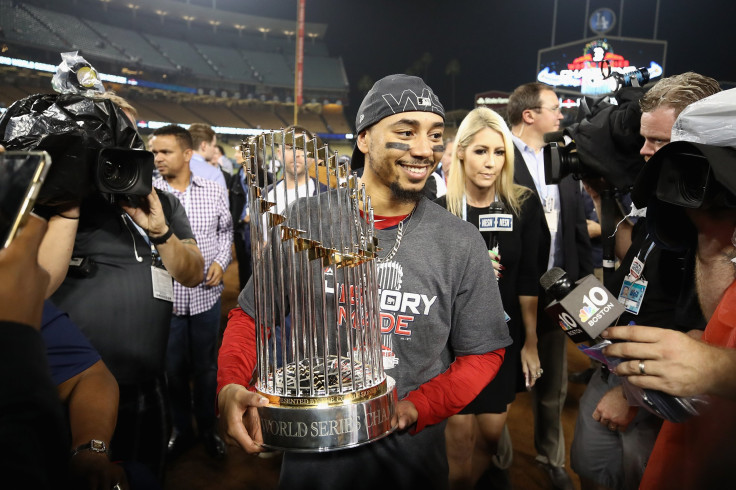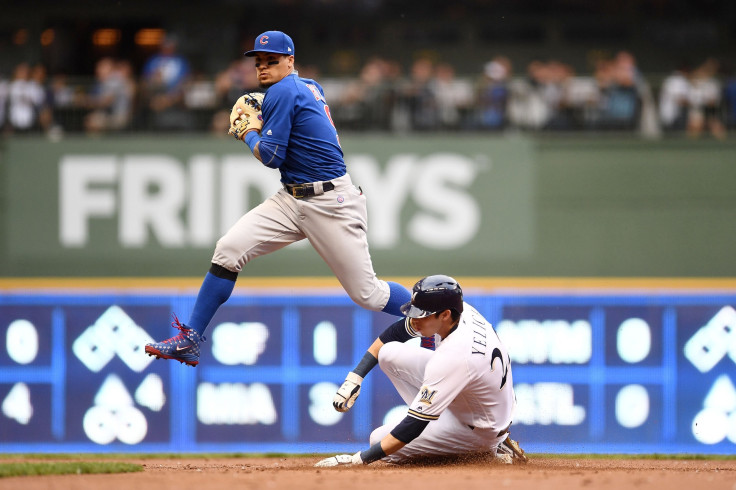MLB 2018 Awards: Predictions For MVP, Cy Young, Rookie Of The Year

Three finalists have been announced for MVP, Cy Young and Rookie of the Year in both the American and National League, though there is a clear favorite for almost every award. The world champion Boston Red Sox have just one candidate. The New York Yankees, Los Angeles Angels, Cleveland Indians, and Washington Nationals are all tied with two finalists each.
The winners will be announced from Nov. 12-15 on MLB Network. Below are predictions for each individual award for the 2018 MLB regular season, including the order in which each player will finish.
American League MVP
1) Mookie Betts (.346/.438/.640, 32 HR, 80 RBI): The only way Betts wasn’t going to win the MVP was if he split votes with J.D. Martinez, but his teammate with the Red Sox didn’t make it into the top three. Winning the batting title and a gold glove while having baseball's highest slugging percentage and WAR on MLB’s best team will give him more than enough first-place votes.
2) Mike Trout (.312/.460/.628, 39 HR, 79 RBI): Trout had another standout year with a league-high 1.088 OPS. He’ll fall short because he missed 22 games and the Angels finished below .500.
3) Jose Ramirez (.270/.387/.552, 39 HR, 105 RBI): Ramirez had another great season, edging out teammate Francisco Lindor for a third-place finish. He was fourth in slugging percentage, OPS and home runs.
American League Cy Young
1) Blake Snell (21-5, 1.89 ERA, 0.97 WHIP, 11 K/9): The Tampa Bay Rays won 90 games by utilizing their bullpen far more than any other team, but the relievers had much less responsibility when Snell took the mound. He won 21 of his 31 starts and led the AL in ERA by 0.32.
2) Justin Verlander (16-9, 2.52 ERA, 0.90 WHIP, 12.2 K/9): A case can be made for Verlander, who ranked first in the AL in starts, strikeouts, WHIP, and strikeout-to-walk ratio. A bad August inflated his ERA and might have ended his chances of winning the award.
3) Corey Kluber (20-7, 2.89 ERA, 0.99 WHIP, 9.3 K/9): With two Cy Young awards and four top-three finishes since 2014, Kluber has arguably been baseball’s best pitcher over the last five years. He led the league in innings pitched and fewest walks per nine innings.
American League Rookie of the Year
1) Miguel Andujar (.297/.328/.527, 27 HR, 92 RBI): There was arguably no more important hitter for the Yankees when Aaron Judge missed most of the second half with an injury. The third baseman was 10th in the AL batting race and seventh in slugging among all players.
2) Shohei Ohtani (.285/.361/.564, 22 HR, 61 RBI, 4-2, 3.31 ERA): Othani might very well win the award because of his contributions as both a hitter and pitcher, in addition to Andujar’s struggles on defense. He was the clear favorite through two months but only pitched 6.1 innings after May.
3) Gleyber Torres (.271/.340/.480, 24 HR, 77 RBI): Torres is the easy third-place finisher. Andujar was a more productive hitter with the Yankees, though the second baseman did have an All-Star caliber first half in only 218 at-bats.
National League MVP
1) Christian Yelich (.326/.402/.598, 36 HR, 110 RBI): Yelich stole this award from Baez with a second half that saw him post an incredible 1.219 OPS and 25 home runs. He’s the easy choice, considering the Milwaukee Brewers beat out the Chicago Cubs for the NL’s best record and Yelich was two home runs and an RBI away from winning the Triple Crown.
2) Javier Baez (.290/.326/.554, 34 HR, 111 RBI): Baez was the NL MVP through the first five months of the season, and perhaps even longer. In addition to his monster offensive numbers, he was a gold glove finalist while getting at least 18 starts at three different positions.
3) Nolan Arenado (.297/.374/.561, 38 HR, 110 RBI): The Colorado Rockies’ third baseman led the NL in home runs while finishing second in RBI and OPS. He’s hit at least 37 home runs with 110 RBI in four straight seasons.

National League Cy Young
1) Jacob deGrom (10-9, 1.70 ERA, 0.91 WHIP, 11.2 K/9): Maybe deGrom’s record would’ve cost him the award a decade ago. Thankfully, we are now smart enough to realize that a pitcher with the third-best ERA since the mound was lowered in 1968 was clearly the best in baseball.
2) Aaron Nola (17-6, 2.37 ERA, 0.97 WHIP, 9.5 K/9): Nola put up sensational numbers for a pitcher that made half of his starts in a very hitter-friendly ballpark. He actually had the top WAR among all pitchers and allowed only 17 home runs.
3) Max Scherzer (18-7, 2.53 ERA, 0.91 WHIP. 12.2 K/9): Scherzer might have been better than he was in 2017 when he won his second straight Cy Young award and third overall. He led the NL in innings, strikeouts and WHIP.
National League Rookie of the Year
1) Ronald Acuna (.293/.366/.552, 26 HR, 64 RBI): It was a two-man race between Acuna and Soto that might ultimately be decided by the Atlanta Braves winning the NL East. Acuna led NL rookies in home runs and WAR.
2) Juan Soto (.292/.406/.517, 22 HR, 70 RBI): Soto did have a higher OPS than Acuna while driving in 70 runs in just 414 at-bats. He’s got an extremely bright future, considering he was just 19 years old for the entirety of the regular season.
3) Walker Buehler (8-5, 2.62 ERA, 0.96 WHIP, 9.9 K/9): Maybe Buehler earned some votes by pitching 6.2 scoreless innings in the Los Angeles Dodgers’ 163rd game to give L.A. the NL West title. He was dominant after the All-Star break with a 2.03 ERA and an opponents’ batting average of .165.
© Copyright IBTimes 2025. All rights reserved.






















